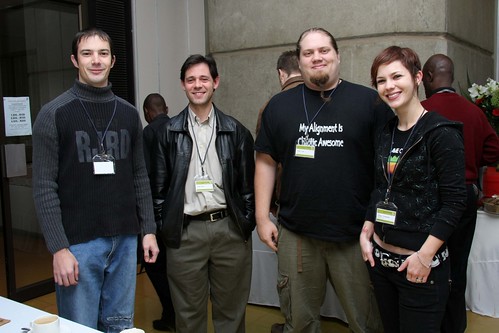Games and Learning Indaba in Johannesburg
Yesterday the second Games and Learning Indaba took place at the University of Johannesburg. It was very different to the first indaba held in Cape Town, I think largely because more game developers attended the Jo’burg event. In total 33 people attended, including researchers from the Meraka Institute and various universities, members of civil society organisations (e.g. SANGONeT and Women’sNet) and a number of teachers.

At the Games and Learning Indaba in Johannesburg
As in Cape Town, the reason for the event was to explore the potential that digital game-based learning holds for education (formal) and learning (informal) in South Africa (SA), especially in improving communication and analytical thinking skills.
Why did people attend the indaba? Game developers wanted to make connections with researchers and ask: are they gamers themselves? Is their work grounded in reality or based on assumptions? Researchers wanted to meet game developers. One attendee came to find out if anyone knew of a game that is as addictive as a first-person shooter, but not as violent. Civil society people wanted to know more about using games for social change, in other words, about serious games. A game developer wanted to know what companies expect to pay for games.
While not all of these questions were answered, what clearly emerged from the session was an interest between game designers and developers, academics and teachers to work together to create, pilot and evaluate games. This will be challenging, as the some of the heated discussions demonstrated, because each of these groups have different interests that motivate them.
A number of game development challenges were discussed:
- It takes an enormous amount of time – and is therefore very expensive.
- It requires specialist skills, often not found in SA.
- The different belief systems and ideas between designers and developers need to be negotiated during the creation of the game.
I gave a short presentation on two gaming conferences that I recently attended.
As in Cape Town, Professor Alan Amory presented again. This quote sums up one of his fundamental beliefs about games and learning:
I don’t think you learn from technology, you learn with technology. When you are designing a learning activity, that is the object of the exercise. The tools, e.g. games, that you use to mediate that learning can be very complex or very simple. That’s a very different way to think about games. It’s not the thing – the game – that is important, it’s what you do with the thing that counts.
All games are socially constructed and have ideologies embedded in them, e.g. those of the game designers and developers. That is why there are games that promote gender bias. That doesn’t matter as long as the game is used as a tool to explore the topic of gender. It is essential to deconstruct these socially constructed artifacts. The process of deconstruction, where the game is used as the discussion starter about violence, gender bias, male dominance, etc. is where the real learning with games occurs.
A point that everyone seemed to agree upon was that gaming, as an element of an increasingly digitally mediated world, is forcing educators to rethink how they teach and how learners learn at a very fundamental level, in a way that talks to youth today.
As the discussions continue on the Games and Learning in South Africa Google Group, we will hopefully see more perspectives, collaborations and findings emerge that will help to exploit the learning potential of games.
More photos of the event on Flickr.



